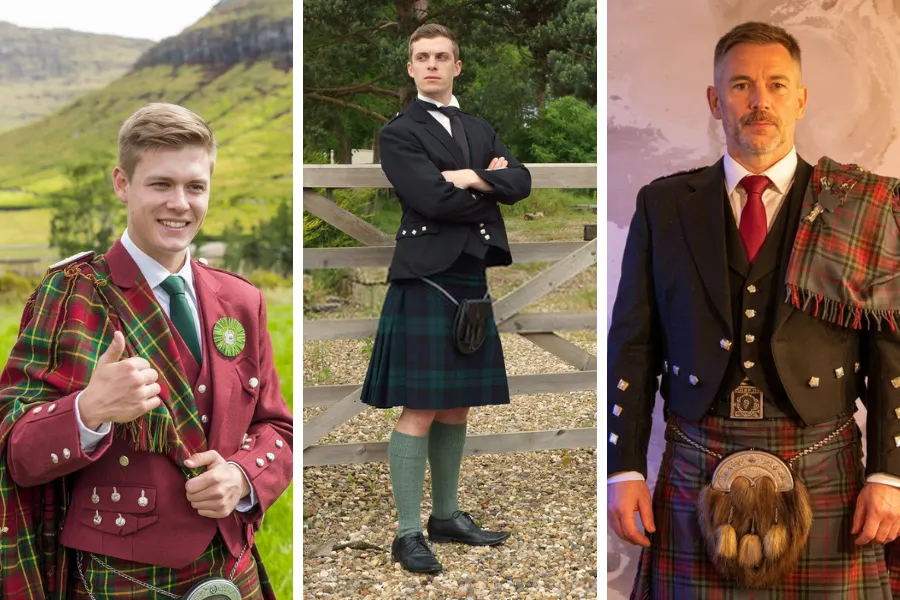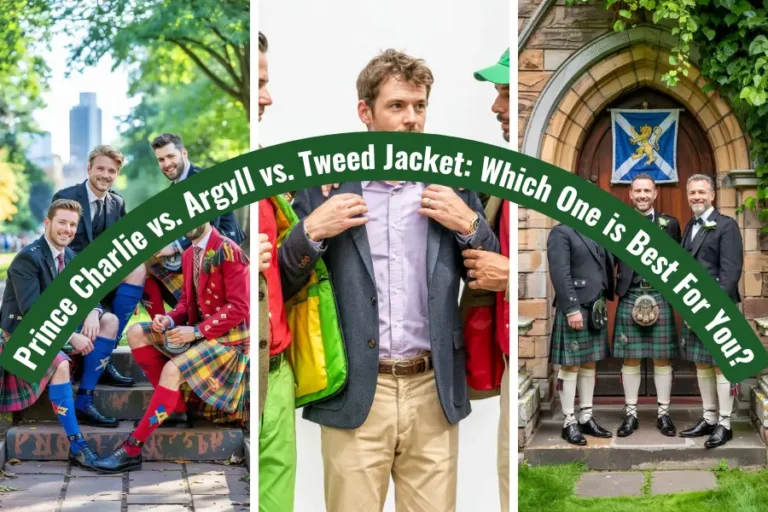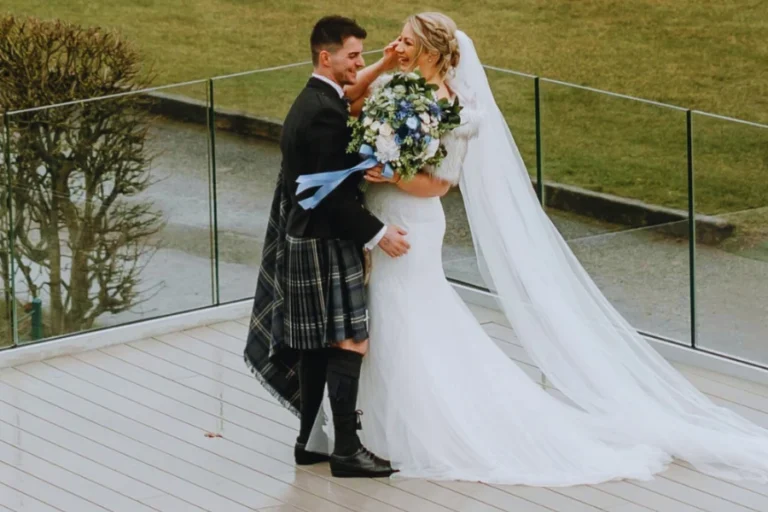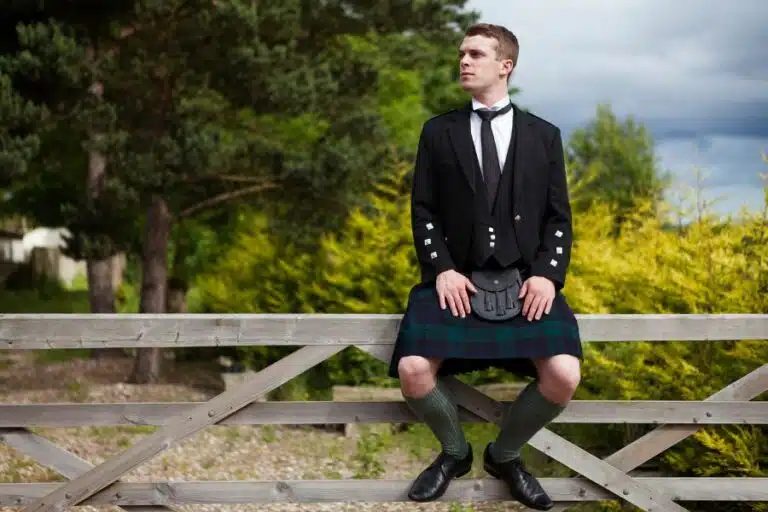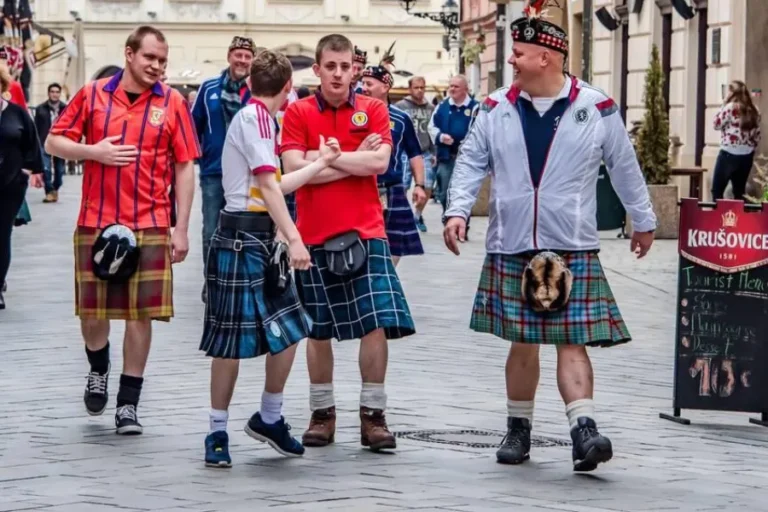Types Of Kilt Jackets
Wearing a kilt is only part of a proper Highland outfit.
You also need the right jacket.
The jacket sets the tone.
It tells people if you’re going to a wedding, a formal dinner, or just out for a pint.
Let’s break down the main types of kilt jackets.
Each one serves a different purpose.
Each one suits a different mood.
1. Prince Charlie Jacket
This is the most formal kilt jacket.
If you’re attending a black-tie event, this is the one.
What makes it formal?
- Short cut, worn open
- Braided epaulettes
- Satin lapels
- Silver buttons in a decorative pattern
- Usually worn with a waistcoat
When to wear it:
- Weddings
- Galas
- Formal dinners
- Highland balls
What to pair it with:
- 3-button waistcoat
- Dress sporran
- Wing-collar shirt with a bow tie
Think about this:
Do you want to look sharp at formal events?
Do you attend occasions where a tuxedo is standard?
If yes, then a Prince Charlie jacket fits your wardrobe.
2. Argyll Jacket
This is the go-to for semi-formal and day wear.
It’s less stiff than the Prince Charlie but still sharp.
Key features:
- Single-breasted
- Flap pockets
- Buttoned cuffs
- Gauntlet cuffs with decorative buttons
- Can be worn buttoned or open
Versatile occasions:
- Weddings
- Burns Night
- Business events
- Ceilidhs
- Church
Popular choices:
- Black barathea wool
- Can come with a matching 5-button vest
Pair it with:
- Semi-dress sporran
- Standard shirt and tie or ruche tie
Consider this:
Need one jacket for multiple occasions?
Want something formal but not over the top?
Start with an Argyll.
3. Tweed Kilt Jacket
Tweed jackets lean casual.
They’re ideal for daytime, country wear, or relaxed events.
Details to look for:
- Earthy or muted colors (grey, brown, green)
- Textured wool
- Elbow patches (optional)
- Less shine, more natural tones
Where you’d wear it:
- Highland games
- Outdoor weddings
- Family gatherings
- Pub outings
- Autumn walks
Best with:
- Plain or tartan tie
- Day sporran
- Button-down shirt
Personal touch:
Tweed gives you variety.
You can pick colors to match your kilt or stand out.
You’ll find many tweed kilt jackets for sale online with unique patterns.
Each one says something different.
4. Braemar Jacket
Similar to the Argyll but with one clear difference—
Cuff style.
Cuffs:
- Braemar jackets have straight cuff buttons
- Argylls have gauntlet cuffs
Other than that:
- Same single-breasted design
- Same versatility
Why choose Braemar?
- You prefer a cleaner sleeve
- You want a subtle detail change
Style tip:
Stick with neutral colors if you’re starting out.
Navy or charcoal works with most kilts.
5. Montrose Jacket
Now we’re back in formal territory.
The Montrose is double-breasted and worn open.
It has a military look.
Visual traits:
- No lapels
- Square cut
- Rows of silver buttons on both sides
- High collar
- Often worn with a high-neck waistcoat
When to wear:
- Ceremonial events
- Pipes and drums band performances
- Special Highland occasions
Pair with:
- Victorian collar shirt
- Dress sporran
- Full-dress accessories
Why pick this:
You want something bolder than a Prince Charlie.
You want a jacket that makes a statement.
6. Sheriffmuir Jacket
Another formal option, but less common.
It has a unique style and historical roots.
What’s different:
- High cut
- Standing collar
- Turn-back cuffs
- Can be worn with or without a waistcoat
Looks good with:
- Jabot and cuffs (for historical flair)
- Dress sporran
- Tartan hose
Think about this:
Do you like a Highland warrior vibe?
Do you want something rare?
Sheriffmuir might be for you.
7. Casual Kilt Jackets
Not every day calls for tweed or buttons.
Sometimes you just want to wear your kilt with a simple top layer.
Options include:
- Softshell jackets
- Hooded zip jackets
- Plain wool jackets
- Leather jackets
When to wear them:
- Hiking
- Casual days
- Traveling
- Festivals
Don’t overthink it:
These aren’t traditional, but they work.
Your jacket doesn’t always need buttons and flaps.
How To Choose The Right Kilt Jacket
Let’s make this simple.
Ask yourself:
- What’s the event?
- What’s the dress code?
- Do you already own a waistcoat or accessories?
- What climate will you wear it in?
- Are you building one outfit or a collection?
Here’s a quick cheat sheet:
| Occasion | Best Jacket |
|---|---|
| Black Tie | Prince Charlie |
| Semi-formal Wedding | Argyll or Braemar |
| Daytime Event | Tweed |
| Ceremonial | Montrose or Sheriffmuir |
| Casual | Softshell or leather |
Where To Find Kilt Jackets For Sale
You’ll find kilt jackets for sale at online shops that focus on Highland dress.
Look for:
- Wool quality (pure wool vs blends)
- Hand-stitching vs machine-made
- Button details
- Custom sizing options
- Matching vests if needed
Pro tip:
Order early.
Tailored jackets take time to arrive.
Bonus question:
Do you want to match your kilt’s tartan, or contrast it?
What Sets Scottish Kilt Jackets Apart
Scottish kilt jackets are shaped for kilts.
They’re shorter, more structured, and designed to sit above the sporran.
You can’t swap in a regular blazer or suit coat.
It won’t sit right.
It won’t look right.
The details matter:
- Sleeve cuffs
- Shoulder epaulettes
- Decorative buttons
- Matching vests
Each element supports the full Highland look.
Final Thoughts
Kilt jackets come in many styles.
Pick one that matches your event, taste, and budget.
Don’t try to make one jacket do everything.
A casual tweed won’t work at a black-tie dinner.
A Prince Charlie won’t feel right at a country fair.
Start with one.
Then build your collection.
Think about where you’ll wear it.
Think about how it fits with your kilt.
Then find a jacket that brings it all together.

